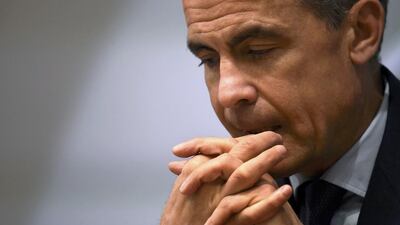The debate – if you can call it that – over Brexit, or Britain’s exit from the European Union – has got more savage and bitter by the day, dividing not only the ruling Conservative Party but the whole electorate, which is increasingly baffled by the avalanche of spurious economic data spewing forth from both sides.
Basically big business and the City are for Remain, small businesses – and there are several million of them – are for Out. And never the twain shall meet – or at least not until June 23, when they have to decide.
Last week, we had no less a person than the governor of the Bank of England, Mark Carney, weighing in for the Remains to the dismay and anger of the Outers. Central bank governors are traditionally not supposed to get involved in politics, although Mr Carney’s predecessor, Mervyn King, did so in the run-up to the 2010 general election when he said that Labour lacked a “credible plan” to restore the public finances – and was pilloried for it. The Blair and Brown governments had left the economy in ruins, he reckoned, and their successor as party leader, Ed Miliband, would only have made it worse.
Mark Carney made it clear he was entering the debate because he feels that the economic implications of Brexit would be pretty catastrophic, resulting in job losses, higher prices and a fall in the pound. It could even plunge the country into recession. Initially there was an attempt by ministers sympathetic to the Out vote to dismiss his intervention as a spontaneous gaffe that he did not really mean. But he stuck to his guns.
Speaking on the BBC on Sunday, Mr Carney said his comments had been “carefully considered”, insisting he had “absolutely not” overstepped the mark. In fact, he said, it was his duty as head of the independent bank to voice an opinion on an issue that could be seriously damaging to the economy.
“The lesson of the run-up to financial crisis [in 2008],” he said, “was to give an institution [the Bank of England] responsibility for identifying risk, to identify the issues, and come straight with the British people and then take steps to mitigate them.” Mervyn King did not do that when the banks were headed for their biggest crisis in 100 years, and now wishes he had.
Unfortunately, the Bank of England has a pretty dismal record on forecasting recessions and right up to the middle of 2008 it still believed the economy would avoid one, or if it didn’t, it would be a short and shallow one, a sort of one-in-nine, which basically meant what the country experienced in the early 1990s under Norman Lamont (when he was the chancellor of the exchequer), or the mid-1980s during Margaret Thatcher’s government. Instead what we got was a 1-in-100, the deepest recession since the 1920s, steeper (although not as socially dreadful) as the Great Depression a decade later. And Mr Carney, although a clever and likeable man – Mr King was even cleverer but certainly not likeable – has got it wrong more times than he has been right. This time around, however, the governor has the weight of the whole business establishment, which is more and more fervently insistent that Out is bad, passionately agreeing with his analysis.
“The Bank of England’s blood- curdling warnings, though politically highly charged, were in truth only a statement of the bleedin’ obvious,” commented the economic columnist Jeremy Warner in The Daily Telegraph after attending an array of conferences and listening to passionate and charged debates over an intense few days.
There have been other unwelcomed entrants into the debate too: Christine Lagarde, the managing director of the IMF, gave it as her opinion that the consequences of Brexit would be “pretty bad, to very, very bad” (the IMF has an even more dismal record of forecasting the British economy than the Bank of England). President Obama urged Britain to stay in, only to be contradicted by Donald Trump, who says that it doesn’t much matter either way, and that a post-Brexit UK would “certainly” not be at the back of the queue to strike a new trade deal with Washington.
Overall, and putting the rhetoric to one side for a moment (not easy), it is now clear that the Remain campaign has won the economic argument, which was always going to happen when there were so many big guns behind it. But the referendum will be won at a much more visceral level, not on economics, as demonstrated over a bloody weekend of brutal savagery between the two camps.
Boris Johnson, who, with his eye on No 10 Downing Street, has emerged as the de facto leader for Brexit, took the debate to new lows when he told The Sunday Telegraph that Hitler and Napoleon had both tried and failed to bring all of Europe under one authority. The EU, he said, was “an attempt to do this by different methods”. Things have to be getting desperate when someone brings Hitler into it.
The bigger point, increasingly obvious from the flow of economic statistics, is that the UK economy is slowing down anyway, as is the US, and may be headed for recession. Remaining part of a dysfunctional union that has been ex-growth for a decade, and which is coming apart at the seams over the immigration issue, is not going to change that.
Ivan Fallon is a former business editor of The Sunday Times

